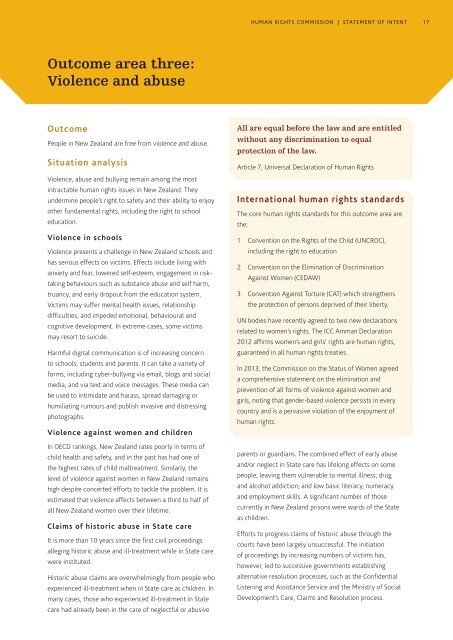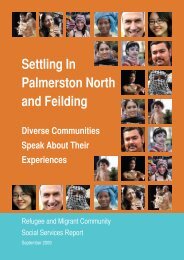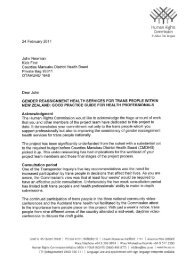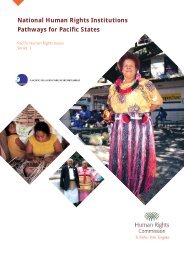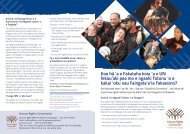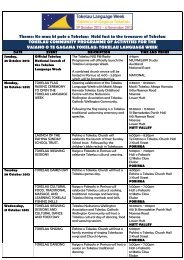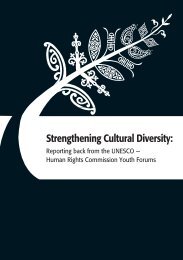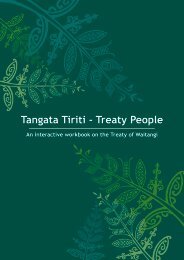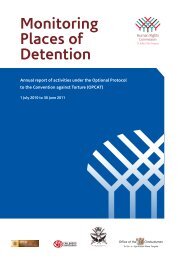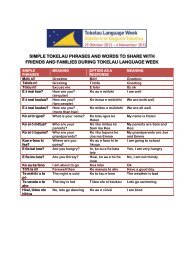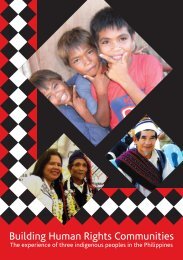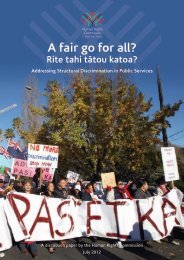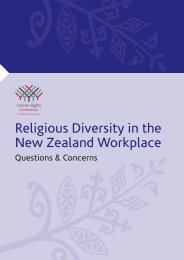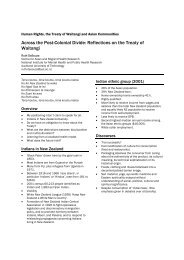Statement of Intent 2013 to 2016 - Human Rights Commission
Statement of Intent 2013 to 2016 - Human Rights Commission
Statement of Intent 2013 to 2016 - Human Rights Commission
You also want an ePaper? Increase the reach of your titles
YUMPU automatically turns print PDFs into web optimized ePapers that Google loves.
HUMAN RIGHTS COMMISSION | STATEMENT OF INTENT17Outcome area three:Violence and abuseOutcomePeople in New Zealand are free from violence and abuse.Situation analysisViolence, abuse and bullying remain among the mostintractable human rights issues in New Zealand. Theyundermine people’s right <strong>to</strong> safety and their ability <strong>to</strong> enjoyother fundamental rights, including the right <strong>to</strong> schooleducation.Violence in schoolsViolence presents a challenge in New Zealand schools andhas serious effects on victims. Effects include living withanxiety and fear, lowered self-esteem, engagement in risktakingbehaviours such as substance abuse and self harm,truancy, and early dropout from the education system.Victims may suffer mental health issues, relationshipdifficulties, and impeded emotional, behavioural andcognitive development. In extreme cases, some victimsmay resort <strong>to</strong> suicide.Harmful digital communication is <strong>of</strong> increasing concern<strong>to</strong> schools, students and parents. It can take a variety <strong>of</strong>forms, including cyber-bullying via email, blogs and socialmedia, and via text and voice messages. These media canbe used <strong>to</strong> intimidate and harass, spread damaging orhumiliating rumours and publish invasive and distressingpho<strong>to</strong>graphs.Violence against women and childrenIn OECD rankings, New Zealand rates poorly in terms <strong>of</strong>child health and safety, and in the past has had one <strong>of</strong>the highest rates <strong>of</strong> child maltreatment. Similarly, thelevel <strong>of</strong> violence against women in New Zealand remainshigh despite concerted efforts <strong>to</strong> tackle the problem. It isestimated that violence affects between a third <strong>to</strong> half <strong>of</strong>all New Zealand women over their lifetime.Claims <strong>of</strong> his<strong>to</strong>ric abuse in State careIt is more than 10 years since the first civil proceedingsalleging his<strong>to</strong>ric abuse and ill-treatment while in State carewere instituted.His<strong>to</strong>ric abuse claims are overwhelmingly from people whoexperienced ill-treatment when in State care as children. Inmany cases, those who experienced ill-treatment in Statecare had already been in the care <strong>of</strong> neglectful or abusiveAll are equal before the law and are entitledwithout any discrimination <strong>to</strong> equalprotection <strong>of</strong> the law.Article 7, Universal Declaration <strong>of</strong> <strong>Human</strong> <strong>Rights</strong>International human rights standardsThe core human rights standards for this outcome area arethe:1 Convention on the <strong>Rights</strong> <strong>of</strong> the Child (UNCROC),including the right <strong>to</strong> education2 Convention on the Elimination <strong>of</strong> DiscriminationAgainst Women (CEDAW)3 Convention Against Torture (CAT) which strengthensthe protection <strong>of</strong> persons deprived <strong>of</strong> their liberty.UN bodies have recently agreed <strong>to</strong> two new declarationsrelated <strong>to</strong> women’s rights. The ICC Amman Declaration2012 affirms women’s and girls’ rights are human rights,guaranteed in all human rights treaties.In <strong>2013</strong>, the <strong>Commission</strong> on the Status <strong>of</strong> Women agreeda comprehensive statement on the elimination andprevention <strong>of</strong> all forms <strong>of</strong> violence against women andgirls, noting that gender-based violence persists in everycountry and is a pervasive violation <strong>of</strong> the enjoyment <strong>of</strong>human rights.parents or guardians. The combined effect <strong>of</strong> early abuseand/or neglect in State care has lifelong effects on somepeople, leaving them vulnerable <strong>to</strong> mental illness; drugand alcohol addiction; and low basic literacy, numeracyand employment skills. A significant number <strong>of</strong> thosecurrently in New Zealand prisons were wards <strong>of</strong> the Stateas children.Efforts <strong>to</strong> progress claims <strong>of</strong> his<strong>to</strong>ric abuse through thecourts have been largely unsuccessful. The initiation<strong>of</strong> proceedings by increasing numbers <strong>of</strong> victims has,however, led <strong>to</strong> successive governments establishingalternative resolution processes, such as the ConfidentialListening and Assistance Service and the Ministry <strong>of</strong> SocialDevelopment’s Care, Claims and Resolution process.


